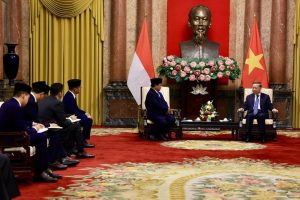Indonesia and Vietnam have agreed to elevate their relations to a comprehensive strategic partnership next year, confirming recent reports that a diplomatic upgrade was on the horizon. The announcement came on Friday, on the first day of Indonesian President-elect Prabowo Subianto’s two-day state visit to Vietnam, one of a plethora of international trips that he has undertaken in advance of his inauguration next month.
“For us, Vietnam has always been a great friend,” the former general said during a meeting with Vietnamese President To Lam, who also serves as chief of the Communist Party of Vietnam (CPV), Reuters reported. “We value this relationship and I am committed to enhance and further this cooperation.”
Prabowo added, “Let us now task our teams to continue our efforts to that goal.”
As per state media reports, Lam and Prabowo also “applauded the strides of the Vietnam-Indonesia strategic partnership,” which was established in 2013, and pledged to expand “cooperation in security-defense, maritime affairs, culture, tourism, transport, people-to-people exchanges, and locality-to-localities ties.”
The two leaders also discussed the recent frictions in the South China Sea and “reaffirmed the importance of peace, stability, safety, security, and freedom of navigation and overflight.” They also made rote affirmations of Association of Southeast Asian Nations (ASEAN)’s processes for resolving the conflict, committing to “advancing negotiations on a practical and effective Code of Conduct” with China. Tellingly, these references to the South China Sea fell toward the bottom of the Vietnamese state media reports on Prabowo’s visit.
Placed somewhat higher were the less sensitive affirmations of the two sides’ determination to raise bilateral trade turnover to $18 billion by 2028 – a target also mentioned during President Joko Widodo’s visit to Hanoi in January. Bilateral trade came to just shy of $14 billion in 2023. Indonesia is Vietnam’s third largest trading partner in Southeast Asia, and Vietnam is Indonesia’s fourth largest.
Similar praise and pledges graced the Indonesian president-elect’s subsequent meetings with Prime Minister Pham Minh Chinh and National Assembly Chairperson Tran Thanh Man on Saturday. During the latter meeting, Man also expressed interest in establishing a comprehensive partnership sometime next year.
An upgrade would make Indonesia the eighth nation to establish a comprehensive strategic partnership with Vietnam. It would also become the first nation in Southeast Asia to do so, although Vietnam is also reportedly planning similar upgrades with Singapore and Thailand.
The “comprehensive strategic partnership” designation is vague, and it does not carry any particular responsibilities or commitments, other than a mutual commitment to partnership and improved relations. But an upgrade would reflect the growing like-mindedness of Indonesia and Vietnam on a range of issues, from economic development – a crucial goal of both governments – to a shared concern about growing regional tensions, particularly in the South China Sea, where both nations have felt the hard edge of China’s growing maritime power.
For Vietnam, too, the upgrade, while mostly symbolic, would be a further expression of its ductile form of “bamboo diplomacy,” which has led the country to initiate a raft of diplomatic upgrades with a range of partners over the past few years.
In addition to its longstanding comprehensive strategic partnerships with China (2008), Russia (2012), and India (2016), Hanoi has recently established them with South Korea (2022), the United States (2023), Japan (2023), and Australia (2024).
































